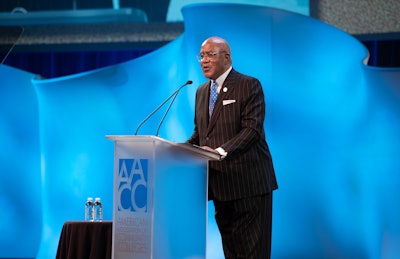 Dr. Walter Bumphus
Dr. Walter Bumphus
Born and raised in Princeton, Kentucky, Bumphus’s path to becoming one of the most influential leaders in community college education wasn’t initially clear. After attending Murray State University in Kentucky, Bumphus began his career in higher education as a director of residence halls at his alma mater, where he discovered his passion for student development. It wasn’t until 1974 that Bumphus took his first community college position at East Arkansas Community College in Forest City, Arkansas.
“I was approached by one of our professors at Murray asking me if I had any interest working in a community college, and I told him I didn’t really and that I was happy working at Murray State,” Bumphus recalls. That decision would prove pivotal, setting him on a trajectory that would span nearly five decades in community college leadership.
What kept Bumphus in the community college sector was recognizing the opportunities it presented, particularly for leaders of color.
“I found quickly that I could look at a career in a community college... not many opportunities for promotion, upward mobility in a university for leaders that look like me,” he explains. “As I started looking at where I had seen leaders of color moving into the presidency, it was primarily in community colleges.”
His career progressed rapidly. At just 24, he became a dean of students, followed by a vice president position at 29, and a college presidency before turning 40. Throughout this ascension, Bumphus was guided by a simple but
powerful principle: “If I was going to be in a role, I wanted to excel in that role.”
Unlike many of today’s emerging leaders, Bumphus didn’t have mentors who looked like him when he started. “I unfortunately didn’t have any mentors when I started in the business that were leaders of color,” he tells Diverse. It wasn’t until his doctoral studies at the University of Texas at Austin that he connected with influential figures like Drs. John Roueche and Terry O’Banion, who helped expand his visibility in the field. He also credits his longtime friends and fellow Murray State alums Dr. Jerry Sue Thornton and Dr. Ken Atwater as important mentors, despite their similar ages. Bumphus— along with Roueche, O’Banion, Atwater and Thornton—are all recipients of the Diverse Champions award presented by Diverse: Issues In Higher Education.
Bumphus’s leadership was particularly tested during crises. As chancellor of Louisiana’s community college system, he navigated the aftermath of Hurricanes Katrina and Rita. The lessons learned during that period— prioritizing communication, ensuring staff received paychecks, and bringing people together regularly—would later inform his approach to leading community colleges through the COVID-19 pandemic at AACC.
When reflecting on his most significant achievements at AACC, Bumphus points to the organization’s pandemic response.
“We were able to put forth a compelling case that community colleges need to be funded along the same lines and the same basis as universities,” he notes. What began as potentially less funding for community colleges eventually became “equal to and better than what universities were doing,” a victory that had immediate impact for institutions serving millions of students.
Bumphus has also been deeply invested in leadership development programs at AACC, continuing initiatives that predated his arrival while seeking to enhance them. His current focus includes what he calls “AACC 5.0,” an effort to amplify successful programs with new initiatives he hopes to unveil by August 2025.
As he prepares to pass the torch, Bumphus offers straightforward advice for his successor: “We just need someone that cares, someone that will listen to staff... and continue to work with them to meet the needs of our colleges.” When asked about the personal qualities that made him successful, Bumphus emphasizes listening—truly hearing people and putting himself in their position to understand what support they need.
For emerging leaders in higher education, Bumphus advises: “Know who you are as a leader. You got to understand yourself before you can start to help others grow.” He adds, “Don’t be too full of yourself. Learn how to laugh at yourself... take your work seriously, but not yourself.”
After retirement, Bumphus plans to return to Austin, Texas, spending more time with his wife, children, and grandchildren. Though he doesn’t envision taking another position, he does intend to write a book.
As he prepares to close this chapter, his legacy of advocacy, mentorship, and transformation in community college education will continue to influence the sector for generations to come. His journey from a young dean in Kentucky to a national education leader demonstrates the power of community colleges not just for students seeking opportunity, but for the leaders who guide these vital institutions.
Listen to our "In the Margins" podcast conversation with Bumphus.




















